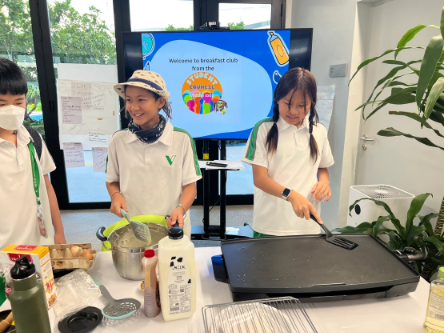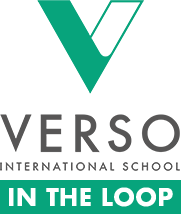ML Muster: Feedback & Learning
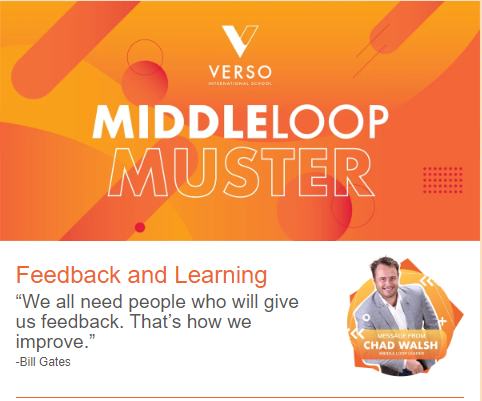
Hope you all had a relaxing and enjoyable Songkran break! As we enter Quarter 4 of the year, our main focus is to end the year on a high. The students are demonstrating great enthusiasm and commitment to their learning. As we approach the end of the year, it is a time for evaluation, reflection, and celebrating growth over time.
There are many ways we can capture and share such growth and celebrate the impressive things that have been achieved. On Friday (TODAY), families will be receiving their child's Quarter 3 VERSO 360 report. This is a progress report which provides feedback on areas of growth while measuring success.
Next Tuesday, 2 May and Wednesday, 3 May, all students in the Middle Loop will also be assessed on their progress in their mathematical strategic and computational thinking and their reading ability. These assessments occur in September and May every year as 2 major touch-points in the year to track growth over time. On Friday, 26 May, we will be inviting parents to meet with their child's Community Time Learning Designer and Specialist Learning Designers to share the milestones, growth areas, and successes. Information on how to sign up to make your ConVERSO appointment will be shared with you in mid-May.
The reason we are sharing this with you now is that feedback is a vital part of learning. When feedback is taken constructively and in a positive manner, it can really lead to improvement and strengthen one's character. In the Middle Loop, we are constantly providing feedback to students on where they are in their learning, why they are there, and how they can improve with the feedback offered.
Rubrics
It is important to note here that we use a 5-point assessment rubric when evaluating learning. This is an example of the competency that has been assessed and based on evidence what level was achieved according to that specific component. Students have time throughout the LAB to move from left to right. This is where feedback is offered along the way and students can respond with evidence that they can demonstrate competency in that area.

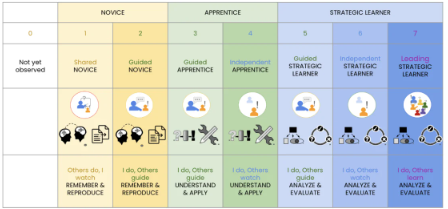
At VERSO, we have 20 Competencies in our program. Learning Designers have developed rubrics for each competency. Below is an example of how they are used in the C7-8 Learning Lab. Students understand the focus areas of learning and identify the phase they are in on the competency-based rubric. Using photos, they move along the rubric as they are able to show what they are learning once verified with a Learning Designer.
Learning Designers are providing constant feedback to set goals and guide them toward success. This is one of the exciting things about competency-based learning. It is ongoing and there are many opportunities for students to reach their goals.
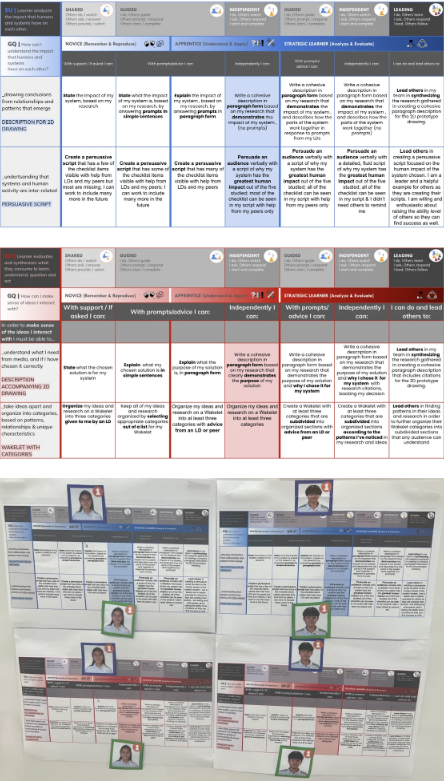
Rubrics are a powerful tool for students to know what is actually being assessed.
We use 'transfer terms' such as Understand and Apply as indicators of how a student can demonstrate what they can do with what they know.
This language helps the student recognize their own actions in their learning and what they are able to demonstrate. Learning Designers analyze what students have come to know and understand in each Lab. We also analyze and evaluate what students can do (Future-Ready Skills) with what they know. Our transfer terms help both the student and Learning Designer examine the behaviors that are being observed explicitly shown throughout the learning experience. These conversations are powerful as the students understand where they are in their learning and what they need to show to move toward Strategic Learner.
In many ways, rubrics are both formative assessments and summative assessments. They can inform students of where they are in their learning as they move through the continuum and they can show the culmination of their learning as a point-in-time reference. Another fancy way of saying this is that formative assessment is (FOR their) learning (to adjust as they go) and summative assessment is (OF their) learning as an overall result.
Below is a HeadRush view that will be used for the Quarter 4 VERSO 360 Report in line with our new 8 point rubric.
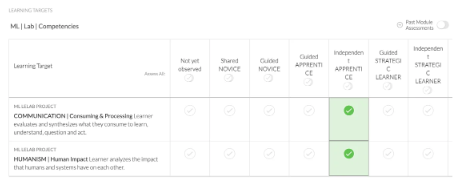
Middle Loop Student Council
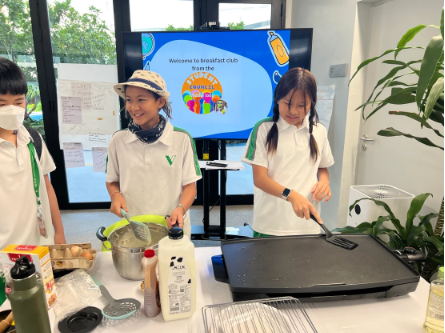 A big shout-out to our Middle Loop Student Council for running Pancake Friday! What a great way to build community and create room for students to demonstrate leadership skills. Every Friday there will be a different theme to bring delight and joy! Every experience leads to something bigger and through that, we change and grow in positive ways as a team. Thank you, Sophia and Uni for leading the charge!
A big shout-out to our Middle Loop Student Council for running Pancake Friday! What a great way to build community and create room for students to demonstrate leadership skills. Every Friday there will be a different theme to bring delight and joy! Every experience leads to something bigger and through that, we change and grow in positive ways as a team. Thank you, Sophia and Uni for leading the charge!
Design Thinking and Explore Projects
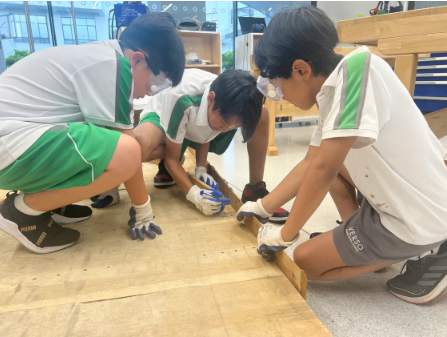
We often think of school as being a place where we only develop the head (brain). It is fantastic to see the Putt Putt Golf Design team using their hands as they move from prototypes to building the actual model.
The maker space is open for business and students are using this space as they enter the next phase of the design thinking process in their Explore project.
Watch this space evolve as we design the VERSO Putt Putt golf course on wheels. Yes, that's right... on wheels.
Fountas and Pinnell | Reading Assessments

Fountas and Pinnell is one of the reading schemes that we use to assess, analyze and record reading ability over time. Next Tuesday and Wednesday, every Middle Loop student will have a face-to-face conference with a Learning Designer and will be assessed on a reading level that reflects their reading ability and skills. Reading is a life skill and this data is important for us to measure to monitor this growth. Please check in with your child's Community Time Learning Designer if you wish to learn more about this process and their reading progress.
GloSS | Math Assessment
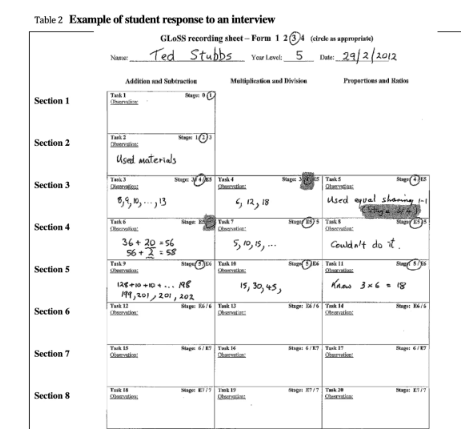
GloSS stands for The Global Strategy Stage and we use this math assessment tool to measure computational strategies in 3 different domains.
Addition and Subtraction. Multiplication and Division. Ratio and Proportion.
If you're interested in the math questions we ask students in the 1:1 conference, please click here. There are 4 sets of interview questions and we rotate these at the different points of the year.
Just like the Fountas and Pinnell reading assessment we use the GloSS math assessment in the same way. It provides insights into strategies students use to solve problems. All thinking is recorded just like the example above that shows their approach to tackling problems to get to the right answer. There are many different ways to solve these problems which is the beauty of such an assessment. We can help students develop easier ways to think or support the workable strategies they have to deploy in Math Lab.
Wrap up
We hope that this edition of the Middle Loop Muster helped parents better understand some of the assessment practices we do to accurately gauge where students are in their learning and how best we can support individual needs.
We are confident that the new 8-point assessment rubric will be a huge benefit when it comes to evaluating learning and goal setting. Feedback and assessment should never be a surprise to a student. It is a partnership between the student, parents and Learning Designer where feedback is welcomed to better guide students in their learning. It is this level of support that promotes growth and improvement - and we all want that for our students.
Now calling all lovers of basketball...
If you enjoy playing basketball and wish to come along every Wednesday at 4:15pm, please come to the Arena to play with parents and Learning Designers. You are very welcome to join us and would like to build our community sports.
Enjoy the long weekend and hope to see you all very soon.
Best regards,
Chad and the ML Team
Tags: Middle Loop Muster
